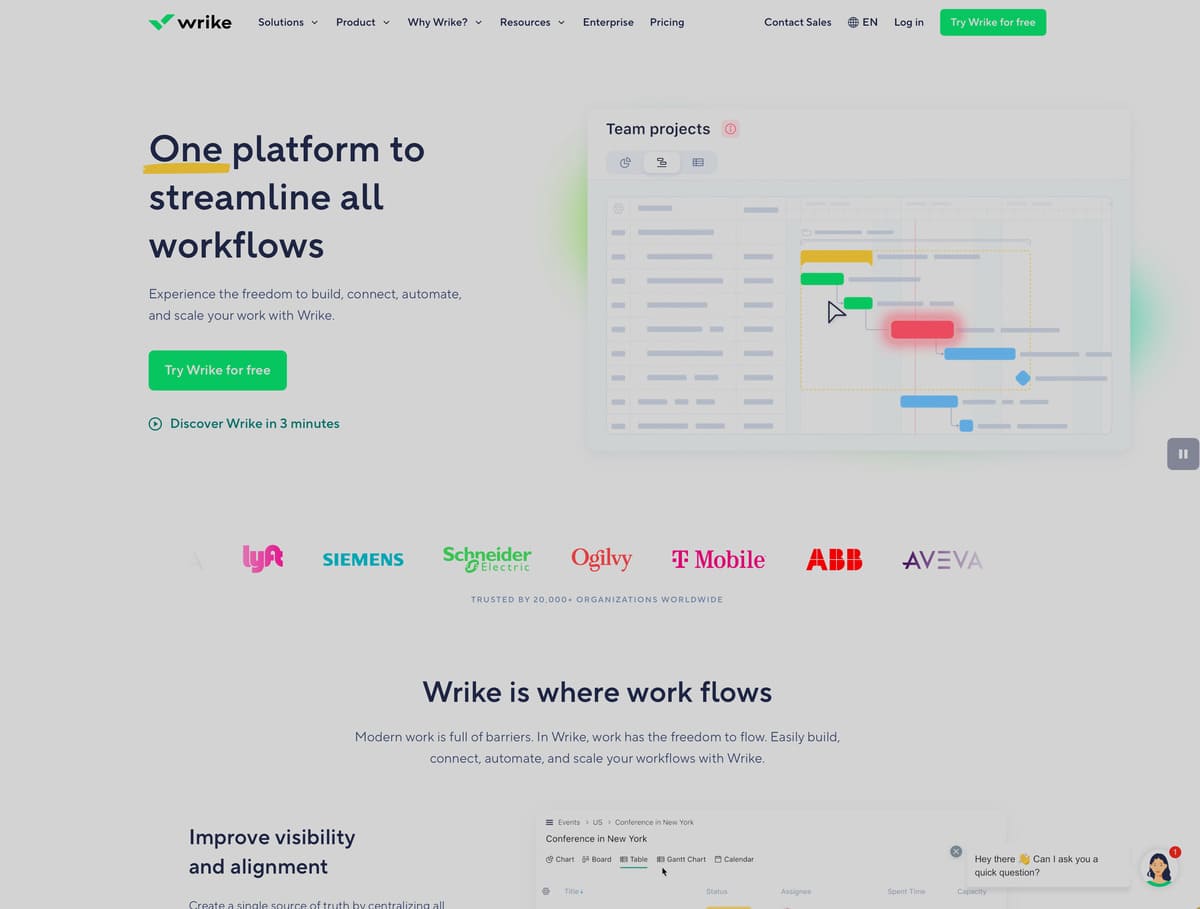Wrike, a leading project management software, offers a comprehensive suite of tools designed to help organisations streamline their workflows, improve collaboration, and boost productivity. However, understanding Wrike’s pricing structure can be a bit complex due to the variety of plans and features available. This guide aims to provide a clear overview of Wrike’s pricing, the features offered at each level, and how businesses can choose the right plan to meet their needs.
Wrike pricing list
| Plan | Monthly Cost (per user) | Billed Annually | Key Features | User Limit |
|---|---|---|---|---|
| Free | £0 | N/A | Basic task management, file sharing, integrations with Google Drive and Dropbox | Up to 5 users |
| Professional | £7.50 | £90 | Gantt charts, advanced task management, shareable dashboards, integrations with Microsoft Office 365 | Up to 15 users |
| Business | £19 | £228 | Custom workflows, time tracking, workload management, advanced reporting, integrations with Salesforce, branded workspaces | Up to 200 users |
| Enterprise | Custom Pricing | Custom Pricing | All Business features, plus advanced security (SSO, 2FA), custom user permissions, audit reports, tailored support options | Unlimited |
| Pinnacle | Custom Pricing | Custom Pricing | All Enterprise features, plus advanced analytics, enhanced automation, industry-specific solutions | Unlimited |
Additional Add-ons
| Add-on | Pricing | Features |
|---|---|---|
| Wrike Integrate | Custom Pricing | Integration with over 400 applications, workflow automation |
| Wrike Resource | Custom Pricing | Resource management, capacity planning, workload balancing |
| Wrike Proof | Custom Pricing | Review and approval of digital content (images, videos, documents) |
| Wrike for Marketers | Custom Pricing | Pre-built templates, custom workflows, advanced proofing tools |

Wrike pricing tiers overview
Wrike offers several pricing tiers, each tailored to different business sizes and project management needs. The tiers range from a free plan designed for small teams to custom enterprise solutions for large organisations with complex requirements. Below is a breakdown of the key pricing plans:
Free Plan
Wrike’s Free plan is ideal for small teams or individuals just starting with project management. This plan includes basic task management features, file sharing, and integration with popular cloud storage services like Google Drive and Dropbox. Users can manage up to five projects simultaneously and collaborate with a maximum of five users. See our guide to free project management software.
Professional Plan
The Professional plan is priced at around £7.50 per user per month when billed annually. It is suited for growing teams that need more advanced features. This plan allows up to 15 users and includes Gantt charts, advanced task management, and shareable dashboards. Additionally, it offers integration with Microsoft Office 365 and other essential business tools.
Business Plan
Aimed at larger teams, the Business plan costs approximately £19 per user per month (billed annually). It provides enhanced project planning and collaboration tools, including custom workflows, time tracking, and workload management. This plan supports up to 200 users, making it suitable for medium-sized organisations. It also features powerful reporting tools, integrations with Salesforce, and branded workspaces.
Enterprise Plan
For large organisations with complex needs, Wrike offers the Enterprise plan, which requires custom pricing based on specific requirements. This plan includes all features of the Business plan, plus advanced security measures, including single sign-on (SSO) and two-factor authentication (2FA). It also offers customisable user permissions, audit reports, and tailored support options to ensure robust data protection and compliance.
Pinnacle Plan
Wrike’s Pinnacle plan is the most advanced offering, designed for enterprises with demanding project management needs. This plan, also requiring custom pricing, includes all features of the Enterprise plan and adds advanced analytics, enhanced automation capabilities, and industry-specific solutions. This tier is ideal for organisations that need comprehensive control over their project management processes and access to top-tier support.
Add-ons and additional features
In addition to the standard plans, Wrike offers several add-ons that can enhance functionality:
- Wrike Integrate: Enables seamless integration with over 400 cloud and on-premises applications, including CRM, ERP, and other business software. This add-on allows businesses to automate workflows across different platforms, priced separately.
- Wrike Resource: Aimed at teams that need robust resource management capabilities, this add-on provides tools for resource allocation, capacity planning, and workload balancing.
- Wrike Proof: Useful for marketing teams and creative agencies, this add-on allows users to review and approve digital content, including images, videos, and documents.
- Wrike for Marketers: A tailored solution that includes pre-built templates, custom workflows, and advanced proofing tools, ideal for marketing teams and agencies. This package is available with Business, Enterprise, and Pinnacle plans.
Choosing the right plan for your business
Selecting the right Wrike plan depends on various factors, including team size, project complexity, and specific business needs. Here are some key considerations to help businesses make an informed decision:
- Team size and growth: Smaller teams or start-ups may find the Free or Professional plans sufficient, while larger teams should consider the Business or Enterprise plans for their broader range of features and scalability.
- Project complexity: Businesses managing complex projects with multiple stakeholders, dependencies, and timelines will benefit from the advanced planning and reporting tools available in the Business and Enterprise plans.
- Security and compliance: Organisations with stringent security requirements or operating in regulated industries should opt for the Enterprise or Pinnacle plans, which offer enhanced security features and compliance support.
- Budget considerations: While Wrike’s higher-tier plans offer more features, they come at a higher cost. Businesses should carefully evaluate their needs and consider whether the additional features justify the expense.
Conclusion – Wrike pricing review
Wrike provides a flexible range of pricing options that cater to various business needs, from small teams to large enterprises. By understanding the features and costs associated with each plan, businesses can select a solution that aligns with their project management requirements and budget.
Whether it’s the simplicity of the Free plan or the comprehensive capabilities of the Pinnacle plan, Wrike has a solution to enhance productivity and streamline project management for any organisation.
For more, see our review of the best project management software, and check our our buyers guide.
Wrike pricing FAQ
The Professional plan costs approximately £7.50 per user per month when billed annually, which totals £90 per user per year. This plan supports up to 15 users.
Wrike’s Business plan is priced at around £19 per user per month when billed annually, resulting in a yearly cost of £228 per user. This plan can accommodate up to 200 users.
Yes, Wrike offers a Free plan that allows up to 5 users to manage tasks, share files, and integrate with Google Drive and Dropbox at no cost.
Wrike’s Enterprise plan has custom pricing, which depends on the specific requirements and features needed by the organisation. There is no set per-user cost, as it varies based on customisation and security needs.
The Pinnacle plan, which includes advanced analytics, enhanced automation capabilities, and industry-specific solutions, also has custom pricing. The cost is determined based on the organisation’s specific needs and scale.
Yes, Wrike add-ons such as Wrike Integrate, Wrike Resource, Wrike Proof, and Wrike for Marketers are available at custom prices, which vary depending on the specific requirements and the scale of the integration.
Yes, Wrike offers a discount for annual billing compared to monthly payments. For example, the Professional plan costs £7.50 per user per month when billed annually, whereas it would be higher if paid on a monthly basis.
Wrike’s Free plan can accommodate up to 5 users. It includes basic task management features, file sharing, and integration with cloud storage services like Google Drive and Dropbox.
For £19 per user per month, the Business plan includes custom workflows, time tracking, workload management, advanced reporting tools, and integrations with services like Salesforce. It supports up to 200 users.
For large enterprises, Wrike offers the Enterprise and Pinnacle plans, both of which are priced on a custom basis. Pricing depends on factors such as the number of users, security needs, and additional features required.

